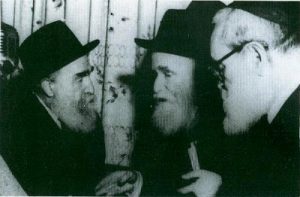Is “Gadol HaDor” a New Concept?

I don’t believe that I have ever read anything by Dr. Marc Shapiro that did not impart new information and enlightenment. I don’t always agree with his analysis, and am fairly confident that he disagrees with much of what I write. But I avidly read his posts, and find much that is instructive.
A recent post of his considered some issues about gedolim and Daas Torah was no different (especially the text between notes 12-17). He makes one contention, however, that I believe can be easily contested:
Contrary to what some think, the term gadol ha-dor is not a recent term. Tosafot,[Berakhot 31b s.v. מורה] and many other rishonim, use it in the sense of a great Torah scholar, but as far as I know, there is no implication in the rishonim that the term means the preeminent Torah leader, as it is used today when people say that X is the gadol ha-dor. (I perhaps should write “scholar-leader”, since one cannot be the gadol ha-dor without being both a scholar and a leader.) When the rishonim use the term it means that X is a gadol ha-dor, i.e., a great sage. Even today, when “the gadol ha-dor” means the preeminent Torah leader, it need not mean that this individual is also the greatest Torah scholar, although sometimes times it does (e.g., when R. Elyashiv or R. Ovadiah Yosef were described as such, I think people assumed that they were the greatest Torah scholars.)
Berachos 63A (bottom), however, demonstrates the concept of gedolei hador as the preeminent halachists – and also throws in (in regard to R Akiva) a special halachic status for the single preeminent scholar of his time. See on this Ramban to Sefer HaMitzvos, Asin 153 (pg 264 in Frankel ed.): מאותה דעה
תהיה הרשות ביד הגדול שבישראל לקדש ולעבור אפ’ בח”ל
The special significance of the single most important halachist of the generation can also be found in Yam Shel Shlomo, Bava Kamma 10:10 והאידנא החשוב שבדורו נקרא ב”ד כל דור ודור לפי שהוא הגדול
And coming from a completely different direction, the Abarbanel, hakdamah to Shoftim וכבר העירו חז”ל למה אמרו ויהי בישורון מלך זה משה, שבמקום שאין מלך גדול הדור הרי הוא כמלך
I sent my observations to Dr. Shapiro a while ago, and I am sure that he will respond in time. They might be valuable to readers in the interim, however.
I also wrote to him that he did not have to go to Tosafos to show the antiquity of the term gadol hador (and its plural). Moed Katan 22B (top) shows it, in the context of one among several or many. It seems apparent there that it does mean halachic expertise, unlike the passage in Pesachim which he correctly cites as meaning something quite different.



in time, let me share my view. today we have become obsessed with naming a godel hador of all poskim, tzaddikim, RY, rebbes, etc. the notion of gadol hador exists in theory, but in only pitifully few generations has that role been universally acknowledged, or even with the benefit of historical judgement generations later. (before the age of global communication, it is hard to even establish how such recognition could occur.) that such an individual may exist is a distinct possibility as (some of) your sources imply; otoh, how many previous generations bothered to name such people is the domain of historians. in that regard, your quotes are interesting but not at all indicative of historical practice. i have no doubt that some of the last geonim, RIF, the Gra and a few others can lay claim to that title but i would be hard pressed to name more than only a few more. by weak analogy, as a mathematician would say, we can prove the existence of the gadol hador by a non-constructive existence theorem.
” i have no doubt that some of the last geonim, RIF, the Gra and a few others can lay claim to that title”. The Gra is probably a perfect example of how someone, despite his greatness, can not be considered the universal gadol hador.
1) The young Chassidic world did not accept his leadership and some didn’t even acknowledge his greatness.
2) Many of his own students didn’t accept his piskei halacha.
3) Who in the Sefardi world even heard of him? If they did know about him, who changed even on psak halacha based on the Gra’s stance?
1) read Prof. I. Etkes’s new book on R. Schneur Zalman of Liadi. chassidim may not have liked him, but they acknowledged his pre-eminence.
2) read Dr. C. Soloveitchik essay “Rupture and Reconstruction” to better appreciate how students behaved relative to their rebbe’s chumrot. In any case, his most important psak – overturned centuries of halakhic theory and the psak of the SA and most rishonim and is now common practice. his students who went on aliyah certainly followed minhagei hagra; i do not know of others. of course today, you still hear, Kirusei and Ushevochacho. 🙂
3) My point about the era before universal communication. Nonetheless, i have limited exposure to sephardi psak but do recall the ben ish chai (and later poskim) referencing the Gaon.
but i generally believe that such a designation was only possible retrospectively.
1) That was the Baa’al Hatanya. Other chassidim wanted to put the Gra in cherem.
2) The group that went to Israel was small and almost by definition, somewhat revolutionary. his main students didn’t follow his psak. Look at the chayei adam and how many times he says “the Gra ruled X, but we do Y”.
3) The era of universal communication was post world war two. i knew someone who learned in poland before the war and never of heard of Rav Chayim. It can’t be that “gadol hador” is a 70 year old phenomena.
What could be true is that gedolim were mainly for a locality or an area, not for everyone. My guess is that what we had post World War 2 was more of a fluke than than the norm. Now that communities have rebuilt themselves and going there separate ways, there is no need or possibility that any one person can be the Gadol for everyone.
I think that this an argument that is a red herring.Gdolim are tremendous Talmidei Chachamim who by virtue of their knowledge of Shas and Poskim and their own tzidkus and yashrus are viewed as the addresses for questions of psak and hashkafa.
It’s logical for any body of true scholars or community leaders (all the more so when the two functions are combined) to have an hierarchy of personal importance based on character, accomplishment and expertise. The informal, high titles given to the true elite are well-deserved. We should recognize that there always has been and needs to be a logical order of merit-based succession as generations follow one another.
logical? IMHO, Not. in most fields an unquestioned “greatest” only appears sporadically. In mathematics, i would be hardpressed to name such an individual in the last century. In physics, Newton and Einstein and???? In philosophy, who since Kant except perhaps Godel. i agree that first-rate is often clear, but the single greatest, not that likely.
There’s no need to postulate a single Gadol HaDor for all communities. One may or may not be available or universally acknowledged at a given time. But, in large measure, we have a meritocracy, not totally perfect, but vibrant in various forms over millennia. Would you be happier to speak of Gedolim in the plural, with their approaches, niches, and zones of influence specified?
For example in the academic scientific world, Dr. John W. Cahn was a giant in materials science, an amazing, absolutely un-pompous person, but he did not presume to know everything about science at the highest level.
https://www.washingtonpost.com/local/obituaries/john-w-cahn-who-fled-nazi-germany-and-became-a-foremost-materials-scientist-dies-at-88/2016/03/15/890fe246-eac6-11e5-a6f3-21ccdbc5f74e_story.html?utm_term=.c1ed0ba90b05
i totally agree that if you define communities very precisely, you have a reasonable shot at naming its most prominent member(s). but three points: 1) it may still be unclear if you have to pick just one. 2) the difficulty in defining a community is not insignificant. 3) politics/public opinion may have an exaggerated role.
” We should recognize that there always has been and needs to be a logical order of merit-based succession as generations follow one another.”
You’re giving the people involved a great deal of credit. Do you really think that someone, no matter what his merits were, could be proclaimed gadol hador if he served as an officer in a combat unit (including miluim) in Zahal (and encouraged others to do so)?
i certainly do!! I considered RAL ztl as the Gadol HaDor, but I guess that does not make him the Gadol HaDor.
In today’s climate there is absolutely no way that anyone encouraging army service wold be given that level of respect, none. Anyone even remotely familiar with Israeli dati politics would understand this point.
we can argue less about the term than about the ‘who is a gadol’ and ‘what authority [or authority over what] do those gedolim hold . one can almost define a haredi jew as one who holds of the concept of daas tora and the authority of a panel of gedolim. [ i e if one is O , and doesnt hold of those 2 ideas, he is almost certainly not haredi ]. it is so second nature in haredi life, that on hearing of an objectionable practice/doxy in another faction, the response will be ‘well rabbi x is your godol and he is against this ‘ , [ the argument ‘the gedolim are against this’ has in many cases softened to ‘our gedolim are against this’ ] . of course many segments of O could almost be defined by NOT holding to either of these concepts. the dilemma for them is getting those to their right to acknowledge that they are not thereby outside the O tent….
For analysis of some pitfalls of the contemporary discourse about Daas Torah and gedolim, see my essay in Tradition 48:2-3 (Summer-Fall 2015). http://www.traditiononline.org/pdfs/48.2/0008-0028.pdf
A teacher of mine once said, to determine who is the gadol hador, ask every group- litvish, sefardi, chasidish, dati leumi, etc.- who the second greatest rabbi is. Each group will name their own rabbi if you ask who is the gadol hador, but if they all agree on who is the “second best”, you know who the real #1 gadol is.